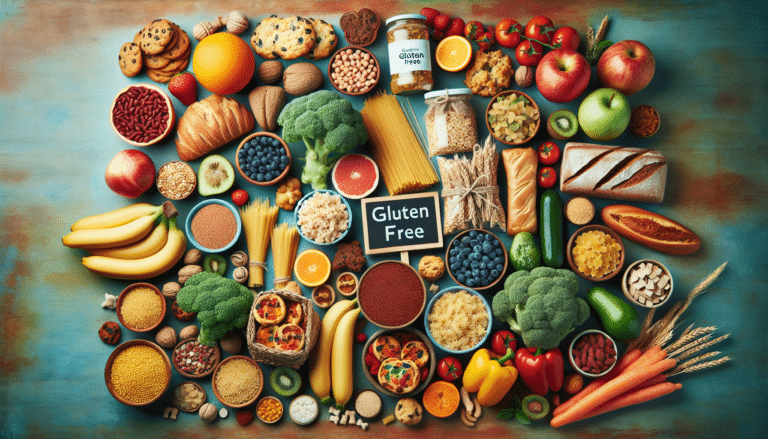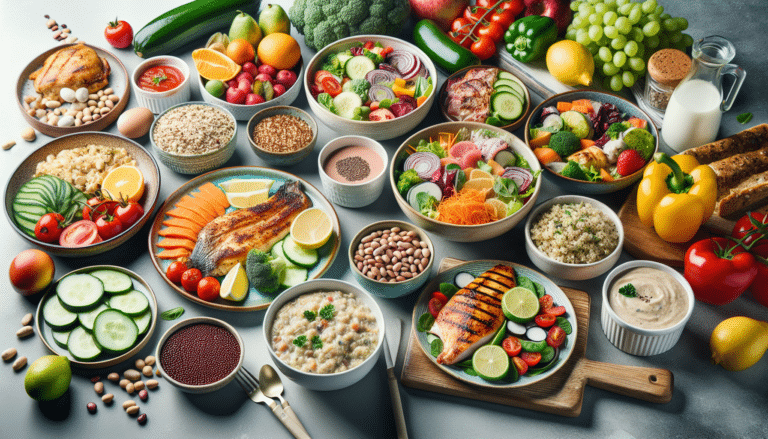In the ever-evolving world of health, it’s no wonder we’re inundated with a plethora of dietary trends and weight loss crazes. Amidst this whirlwind, the gluten-free diet has surged in popularity, garnering attention for its purported weight loss advantages. So, what’s the deal with gluten? How does banishing it from your meals help shed those stubborn pounds? Join us as we unravel the four primary reasons behind gluten-free weight loss success and share tips for a smooth, enjoyable transition.
1. Reduced Calorie Intake and Improved Nutrient Absorption
Embarking on a gluten-free journey can be transformative for weight loss, primarily due to the simultaneous slashing of calorie intake and the bolstering of nutrient absorption. As gluten exits your diet, so do numerous calorie-laden, processed foods that impede weight loss. Meanwhile, wholesome, nutrient-packed alternatives step in, paving the way for improved nutrient uptake. Let’s dig deeper into these crucial aspects.
Reduced Calorie Intake
The gluten-free lifestyle necessitates ditching gluten-rich foods, notorious for their high caloric content and nutritional deficiencies. Farewell, bread, pasta, cookies, cakes, and other processed delights! Instead, healthier gluten-free substitutes step up, organically trimming your overall calorie consumption.
Picture this: you swap the calorie-heavy, sugar-stuffed muffin for a steaming bowl of gluten-free oatmeal, adorned with fresh fruit and a dollop of Greek yogurt. Not only do you cut calories, but you also reap vital nutrients that propel your weight loss voyage.
Improved Nutrient Absorption
Embracing gluten-free living often ushers in a bounty of whole, unprocessed foods. Fruits, veggies, lean proteins, healthy fats, and gluten-free grains step into the spotlight, offering a treasure trove of vitamins, minerals, and essential nutrients to bolster overall health.
A balanced, nutrient-dense diet promotes superior nutrient absorption – a game-changer for those with celiac disease or non-celiac gluten sensitivity, who may have previously struggled with nutrient uptake. Heightened nutrient absorption ensures your body receives the vital fuel to function at peak performance, paving the way for elevated energy, a revved-up metabolism, and, ultimately, weight loss.
In essence, the dual forces of reduced caloric intake and enhanced nutrient absorption underpin the triumph of the gluten-free diet in weight loss. By banishing calorie-dense, gluten-laden foods and welcoming nutrient-rich whole food alternatives, you lay a sturdy foundation for lasting, healthy weight loss.

2. Decreased Inflammation and Enhanced Gut Health
The gluten-free diet’s effectiveness in promoting weight loss is not solely dependent on reduced calorie intake and improved nutrient absorption. Another powerful combination contributing to its success is the decrease in inflammation and enhancement of gut health that often accompanies this dietary change. These interconnected factors play a crucial role in optimizing digestion, immune function, and overall well-being, ultimately contributing to effective weight loss. Let’s delve deeper into how decreased inflammation and enhanced gut health can support your weight loss journey.
Decreased Inflammation
Inflammation – a protective immune response – is crucial for fending off infections and healing injuries. Yet, chronic inflammation can spell trouble, giving rise to health complications like weight gain and stubborn weight loss. For some, gluten consumption may trigger inflammation, culminating in gastrointestinal woes and other unpleasant symptoms.
Embracing a gluten-free lifestyle could spell relief, with inflammation levels taking a nosedive – a boon for those battling celiac disease, non-celiac gluten sensitivity, or wheat allergies. As inflammation subsides, expect improved digestion, less bloating, and a surge in energy, all propelling your weight loss quest.
Enhanced Gut Health
Your gut, an unseen metropolis teeming with trillions of microorganisms—the gut microbiome—holds sway over your overall health. These microscopic denizens aid in digestion, nutrient absorption, and immune function. For some, gluten behaves like an unwelcome intruder, disrupting the delicate balance of this microscopic ecosystem and spawning gastrointestinal turmoil.
Choosing a gluten-free path may breathe new life into your gut health, fostering the growth of beneficial bacteria. This gut revitalization can streamline digestion, optimize nutrient absorption, and bolster immune function, giving your weight loss journey a much-needed boost. Moreover, a well-balanced gut microbiome can help regulate appetite and metabolism, laying the foundation for effective weight management.
Decreased inflammation and enhanced gut health are essential factors in the gluten-free diet’s effectiveness for weight loss. By reducing inflammation and promoting a healthy gut, you create an environment conducive to sustainable and healthy weight loss.

3. Better Appetite Control and Satiety
The perpetual tussle with hunger and food cravings is a primary weight loss hurdle for many. Enter the gluten-free diet, with its uncanny ability to tame the appetite beast and ramp up satiety, making weight management more attainable. Integrating high-fiber, protein-packed, and healthy fat-laden foods into your gluten-free regimen can effectively keep hunger at bay and prolong fullness. Let’s unravel the underpinnings of these perks and how they can catapult you to weight loss success.
High-Fiber Foods
A gluten-free diet often includes naturally gluten-free whole grains, fruits, and vegetables, which are rich in dietary fiber. Fiber is an essential nutrient that aids digestion, helps regulate blood sugar levels, and supports heart health. Most importantly, fiber-rich foods can help you feel fuller for longer, reducing the likelihood of overeating or indulging in unhealthy snacks.
By focusing on fiber-rich gluten-free foods, you can improve appetite control, avoid excessive calorie consumption, and promote healthy weight loss. Examples of fiber-rich gluten-free foods include quinoa, brown rice, fruits, vegetables, beans, and legumes.
Protein-Rich Foods
Protein plays a vital role in weight management, as it contributes to satiety and supports the maintenance and growth of lean muscle mass. A gluten-free diet often involves consuming protein-rich foods, such as lean meats, fish, poultry, eggs, dairy products, nuts, and seeds. By incorporating these foods into your diet, you can maintain a sense of fullness and better manage your appetite.
In addition to promoting satiety, protein-rich foods can also support weight loss by increasing energy expenditure and enhancing muscle growth, which can improve your metabolism and overall calorie-burning capabilities.
Healthy Fats
Healthy fats, such as monounsaturated and polyunsaturated fats, are crucial for overall health, and they play a crucial role in appetite control. Foods rich in healthy fats, like avocado, nuts, seeds, and olive oil, can help you feel satisfied and curb your appetite. Including these foods in your gluten-free diet can make it easier to manage your hunger and stick to your weight loss plan.
Better appetite control and increased satiety are essential factors in the gluten-free diet’s effectiveness for weight management. By emphasizing high-fiber, protein-rich, and healthy fat-containing foods, you can keep hunger at bay, maintain a sense of fullness, and ultimately achieve your weight loss goals in a sustainable manner.

4. Enhanced Energy Levels and Metabolism
A crucial aspect of successful weight loss is having the energy and motivation to stay active and maintain a healthy lifestyle. The gluten-free diet offers a unique advantage in this regard, as it can lead to enhanced energy levels and a boosted metabolism. This energizing effect is primarily due to the elimination of processed foods and the increased consumption of nutrient-dense, whole foods that provide the body with the necessary fuel for optimal functioning. Let’s examine how enhanced energy levels and a boosted metabolism can support your weight loss journey.
Enhanced Energy Levels
One of the key benefits of adopting a gluten-free diet is the potential increase in energy levels. By cutting out gluten-containing, processed foods and replacing them with whole, nutrient-dense options, you provide your body with essential nutrients, such as vitamins, minerals, and antioxidants. These nutrients support various bodily functions, including energy production.
Higher energy levels can significantly impact your weight loss journey, as they enable you to stay active and engaged in regular physical activity. Exercise is a vital component of weight loss, as it helps burn calories, build lean muscle mass, and improve overall health and well-being.
Boosted Metabolism
Metabolism refers to the process by which your body converts food into energy. A higher metabolism means that your body is more efficient at burning calories, even at rest. One of the factors contributing to the gluten-free diet’s effectiveness for weight loss is its potential to boost metabolism.
This metabolic boost can be attributed to several factors, including:
- Increased consumption of nutrient-dense foods that support optimal bodily functions
- Improved gut health, which can positively impact metabolism and energy levels
- Higher intake of lean proteins, which can help build and maintain lean muscle mass, leading to a more efficient calorie-burning machine
By enhancing energy levels and boosting metabolism, the gluten-free diet creates a conducive environment for weight loss. This allows you to burn more calories throughout the day and engage in regular physical activity, ultimately supporting your weight loss goals.
Enhanced energy levels and a boosted metabolism are vital factors in the gluten-free diet’s effectiveness for weight loss. By eliminating processed foods and focusing on nutrient-dense, whole foods, you can support optimal bodily functions, stay active, and burn more calories, helping you achieve your weight loss goals in a healthy and sustainable manner.
Conclusion
Going gluten-free offers numerous potential benefits for those looking to lose weight. By promoting a reduced calorie intake, improved nutrient absorption, decreased inflammation, better appetite control, and enhanced energy levels and metabolism, this dietary approach can help you achieve your weight loss goals in a healthy and sustainable manner. Remember to consult with a healthcare professional before making any significant changes to your diet, and be patient as your body adapts to this new way of eating.
Frequently Asked Questions
What is gluten?
Gluten is a protein found in certain grains such as wheat, barley, and rye. It helps give dough its elasticity and provides texture to baked goods.
Can everyone benefit from a gluten-free diet?
While a gluten-free diet can offer various health benefits, it is not necessary for everyone. Individuals with celiac disease, non-celiac gluten sensitivity, or a wheat allergy should follow a gluten-free diet. However, if you are considering going gluten-free for weight loss or other health reasons, consult with a healthcare professional before making any significant changes to your diet.
What are some common gluten-containing foods to avoid?
Some common gluten-containing foods include bread, pasta, cereals, baked goods, beer, and certain sauces and seasonings. Always read food labels carefully to ensure they are gluten-free.
What are some nutritious gluten-free food options?
There are many naturally gluten-free foods, such as fruits, vegetables, lean meats, fish, poultry, eggs, dairy products, nuts, seeds, and gluten-free grains like quinoa, rice, and buckwheat. Focus on consuming whole, unprocessed foods for optimal health and weight loss benefits.
Will I automatically lose weight on a gluten-free diet?
While many people may experience weight loss after transitioning to a gluten-free diet, it is not guaranteed. Weight loss primarily depends on creating a calorie deficit, which can be achieved by consuming fewer calories than your body needs to maintain its current weight. A gluten-free diet can help by reducing calorie intake and promoting better nutrient absorption, but it’s essential to maintain a balanced, nutrient-dense diet and engage in regular physical activity for optimal weight loss results.
References:
- Biesiekierski, J. R. (2017). What is gluten? Journal of Gastroenterology and Hepatology, 32(S1), 78-81.
- Gaesser, G. A., & Angadi, S. S. (2012). Gluten-free diet: imprudent dietary advice for the general population? Journal of the Academy of Nutrition and Dietetics, 112(9), 1330-1333.
- Leonard, M. M., & Vasagar, B. (2014). US perspective on gluten-related diseases. Clinical and Experimental Gastroenterology, 7, 25-37.
- Vazquez-Roque, M. I., & Camilleri, M. (2011). Dietary fiber, weight loss, and chronic constipation. Gastroenterology Clinics, 40(1), 21-30.







